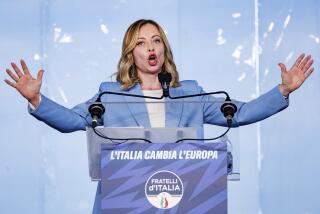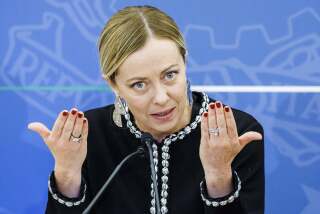As Italy elections approach, players get into position
- Share via
LONDON — First, Silvio Berlusconi, who was driven from power last year by Italy’s economic woes and his own scandals, said he wanted back his old job as prime minister. Then Mario Monti, an appointed technocrat who succeeded him at the head of an unelected government, kept the nation guessing for weeks before suddenly declaring that he would dive into politics and seek to lead the next government.
They’re only part of a perplexing lineup of political candidates voters will face in February’s elections as political parties begin a frantic search for coalition partners.
To begin with, Berlusconi’s business-oriented, center-right Freedom Party was warned late Saturday that its former governing partner, the Northern League, would not be interested in a reprise if Berlusconi insists on another term as prime minster.
In Italy’s growing array of parties led by non-politicians, other contenders who will be seeking allies are the Five Star movement, an anti-austerity protest group led by former comedian Beppe Grillo; and a center-left group guided by former magistrates.
Then there are the classic political candidates: the reformed communist party, the Democratic Left, led by Pier Luigi Bersani, which is expected to win the largest share of votes; and Monti’s chief ally, the Democratic Center Union party under Pier Ferdinando Casini.
Monti, a 69-year-old economics professor, became prime minister last year at the head of a Cabinet of technocrats with a mandate to fix the sagging economy. His government brought Italy back from the brink of financial disaster to a fragile economic recovery and won back credibility among the 16 other nations in the Eurozone. But he was forced to resign this month when Berlusconi’s party withdrew its support for his reforms, which had become increasingly unpopular.
Monti, who remains in charge of a caretaker government until the elections, had said repeatedly that he was not interested in electoral politics. He announced last weekend that he would not seek another term without the support of a reformist coalition, which he said Friday that he had gained.
His decision did not sit well with Berlusconi, whose own time as prime minister was disrupted by scandals both financial and sexual.
“He has contradicted the guarantees that he had given at the beginning of his adventure as prime minister. He had guaranteed to the president of the republic and to me, outgoing prime minister, and the Italians that he would not profit from the publicity of standing in the pulpit of this technical government to present himself as a political protagonist,” Berlusconi said in a TV interview Saturday. The decision would result in “a significant loss of credibility” for Monti, he said.
In addition to Casini’s party, Monti’s new coalition includes the newly formed civic party Italia Futura, which grew out of a think tank founded by Monti and led by Luca Cordero di Montezemolo, head of Italy’s prestigious Ferrari racing automobile company.
In a four-hour meeting Friday night with centrist political parties in agreement with Monti’s recently laid down guidelines for Italy’s financial and social future, he and his allies worked out their proposals for Italy’s economic and social future. They will present lists of candidates for both houses of Parliament.
Monti’s name will not be on the ballot in February, but he will seek the support of the coalition’s newly elected lawmakers and others when Parliament chooses the next prime minister.
“Finally we’ve turned our backs on populism, demagogy and false electoral promises,” Casini said after the meeting. “From today a new phase of responsibility has begun.”
Polls give Monti’s coalition and its continued program of rigorous austerity reforms only about 20% of the vote.
Stobart is a news assistant in The Times’ London bureau.
More to Read
Sign up for Essential California
The most important California stories and recommendations in your inbox every morning.
You may occasionally receive promotional content from the Los Angeles Times.













